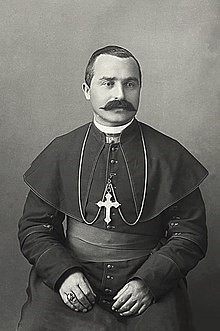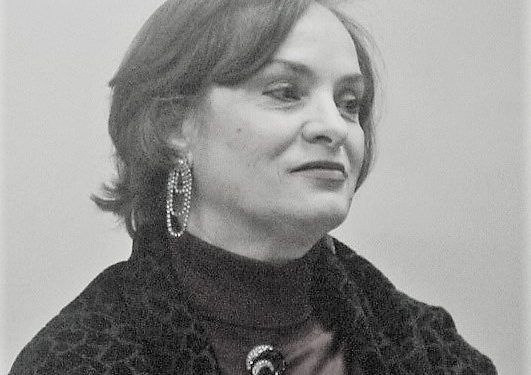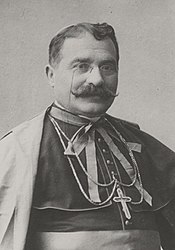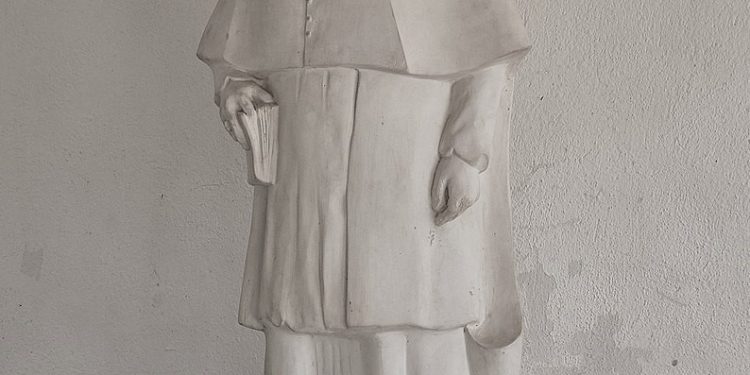By Albana Lifschin (Melyshi)
Memorie.al / “Abbot of Mirdita – One of the first men of our nation, with this name they have names and can tell you for sure that, there is not one end of Albania, where men of wisdom and skill, of do not have heard and mentioned this name”. (Gjergj Fishta). He was the only boy in the family and the only male in the house. They named him after his father, who died just a few days before the baby was born. He would grow up handsome and noble, and he would be able to marry the most beautiful girl in the province, fill his mother’s womb with grandsons and granddaughters, and devote himself to his family. But his life took another direction. He devoted himself to Albania.
When she entrusted her son, still a boy, Bishop Pal Domazei, to educate him and prepare him to become a priest, the wise nun whispered those words that are the concern of every mother: “It will be done for you”. She had blessed her Father, with the virtues of the province, of faith and honor, and was leading him on a long road, from which he would return to her, as one of the most outstanding men of the nation.
Childhood passed very quickly and youth came full grown. At the age of 17, he, Prend Doçi, a student of the ‘Urban’ College of Rome, had begun to understand that theology did not comprise the whole pivot of his interests. It was given a lot after the works of the old Albanian writers, of the Albanian language and literature. Rioshi often went to Arbëresh villages in Italy and became friends with Jeronim De Radë, his lifelong friend. Meanwhile, he studied Christian philosophy and became familiar with European civilization, his mind stayed in Albania, especially in Mirdita, his hometown, whose relations with the High Gate were getting worse and worse. The Mirdita uprising of 1862 had failed, and Porta e Lartë aimed to destroy its autonomy at all costs.
Prend Doçi returned to his homeland in 1871, after completing his studies, and started working at the Abbey of Oroshi, near Gaspër Krasniqi. Abbot Krasniqi had been the inspiration and organizer of the uprising of 1862. From him, Prend Doçi, was informed in detail about the uprising and especially the reasons for its failure. At the same time, he learned that foreign clerics continued to be appointed in the province, which played a very negative role in the people, preaching submission to the Ottoman authorities. From his childhood, he remembered that even in Bulgaria, where he was born, people complained that the priest did not speak Albanian. The situation that made it even worse.
Precisely, the concern for the appointment of a foreign priest, in Kalivare, forced Abbot Kransiq to send Father Doci there, even though there was a need for his help in Orosh. Father Doçi, who realized that his work would never be limited only to his parish, but much beyond. When in 1877, the uprising began in Mirdito, the inspirer and organizer was himself, Prend Doçi. The young priest followed in the footsteps of Abbot Krasniqi and the uprising was a continuation of that of 1862, but wider and more popular. He paid attention to the bond of faith between the 12 bajraks of Mirdita, and at the head of it was not just one man (as in 1862), but the heads of the 12 bajraks and Prend Doçi, who was their advisor.
Prend Doçi imagined Mirdita as the center of the uprising, and the liberation from the Ottoman Empire would start from it, first, and then it would spread throughout Albania, when the liberation of the whole homeland was achieved, the people themselves would choose the form of government. , Kingdom or Republic. The inspirer and fighter of the uprising, the priest with the veladon, armed as a freedom fighter, from one province to another to reach the union. The cleric left an impression on people, as a man of the assembly, of faith and of the rifle. From Shkodra, he secured the support of a group of patriots, among whom, Zef Jubanin, meanwhile maintained close ties with his friend Jeronim De Radën. Arbëreshes had created a committee to help the uprising. Dora D’istria, for its part, made the voice of the insurgents known in Europe.
In July 1876, Porta e Lartë requested that Mirdita send volunteers against Montenegro. Following the advice of Prend Doçi, the leaders of the Bajraks rejected this request, on the contrary, they asked for the release from exile of Preng Bib Doda, as the president of the country and a symbol of the union of the 12 Bajraks, which was achieved. With the arrival of Preng Bib Dodő in Mirdő, Father Prend Doçi continued his mission of uniting the forces and increasing the allies of the uprising. In his travels, he made new friends and met famous friends. In the meeting with Dede Gjo Lulin, he told him with longing: “Don’t forget that, in these mountains, it has not been extinguished, nor has it ever been extinguished, for life and weather, the flame of freedom… and as long as the name of Skanderbeg lives, which you hear everywhere in these mountains, lives and lives in Albania”.
Meanwhile, from Lezha, his superior, Ipeshkv Malchinskij, called on him to abandon the uprising and return to the ecclesiastical duties. Confused between religious duty and patriotic duty, Prend Doçi chose the latter. Bishop Malchinskiy, suspended him from office. He reported that: “Prend Doçi, incited the rebellion in the Parish, marched across the mountains with his brave men, with the bazhibozuks of Preng Bib Doda, to raise the people under his own flag.” The Turkish authorities declared him “illegal” with a decree from the Sultan.
But Father Prend Doçi, even after the suppression of the uprising, continued to stay in the mountains with his comrades, giving them heart, until the day he was surrounded. And at that moment, he asked the Turkish commander to release his mountain companions, that “they are not to blame”. This noble gesture saved their lives, while Prend Doçi was taken to Istanbul in handcuffs was only 31 years old.
When they surrounded him, he could have saved a bullet for himself so that he would not be surrendered alive, but he judged that; if he were to die; would leave his mission unfulfilled. That’s why he said to his comrades: “Prison has a door, the grave doesn’t”. In the Istanbul prison, where they had prepared his death, there was a savior angel, the prison waterman, who happened to be a boy from Mirdita. Prend Doçi gave him a letter for the Armenian Catholic Patriarch Stefan Azarjan, who was also a friend of the Sultan. The Patriarch, together with the Austro-Hungarian consul, was able to obtain from the Sultan the decree for the release of Prend Doçi from prison, on the condition that he: “leave immediately outside the borders of the Ottoman Empire, and not return without special permission from the Porta the Upper”.
Thus, the fall of 1877 found Prend Doçi thousands and thousands of kilometers away from his homeland, in a place that he would probably never have thought of. Right after his release from prison, the illegal Prend Doçi, who addressed the Holy See for help for his compatriots, so that they could start fighting again against Turkey? In response, the Holy Congregation started him with ecclesiastical duties in St. John, Newfoundland, Canada.
He was the first Albanian to set foot on the American continent, in one of its coldest spots. Human imagination, under these conditions, would awaken the vision of a lonely man, without a second to utter a word in his mother tongue, falling spiritually. But Prend Doçi was not an ordinary man. Even in the height of winter, the Albanian missionary used to go to the centers of workers and fishermen and to the villages, after putting shoelaces on them, to make it easier to walk in the snow. The name of Prend Doçi, the priest of the city, was mentioned with respect and became known in the Canadian newspapers of that time.
After 6 years, from the day he set foot in St. John, made an attempt to return to his homeland even though he knew that the Sultan’s decree weighed on his name, which made it impossible for him to return. However, from the Holy See, he was given an option: to go on duty to Athens. He accepted, because there he was closer to his homeland and he had the hope that one day, he would get permission from the High Gate to break into his homeland. In Athens, he met the patriotic Albanians, who had created the “Corfuzi Committee” covenant.
Knowing and associating with the Albanians of Greece was seen with suspicion and Ipeshkv Malčinskij, who followed the activities of Father Prend Doç at every step, found a reason to accuse him of; has sent instructions through Mirdito, to raise the people in an uprising. The accusations caused the Holy See to send Father Doc, from Athens, to Bombay, India. As far as possible from the homeland!
However, the years in Canada and then in Bombay gave Prend Doçi the opportunity to get to know the cultures of different peoples, the way of life, but also the ways of governance. Equipped with experience and a cultural baggage, like never before, he was burning with the desire to once again restart his patriotic work in the homeland. He expressed his longing for the homeland in the letters he exchanged with his old friend, De Radë. He closed one of these letters with the words: “Don’t forget your exile”. The distance from the homeland ignited the love for him more, as the wind ignites the fire.
Prend Doçi, he was called to Rome in the fall of 1886. The workplace near the branch of the mission in the Balkans, which was quite convenient, to get to know the anti-Albanian activities of the Greek Patriarchate of Istanbul, which prompted him to send them a letter to Cardinal Simon, a high official in the Vatican, who directed the missions of the East, where he emphasized the fact that; Greek Patriarchate; has banned the Albanian language in all Christian schools in Albanian lands and was opening Greek schools in Albania; declaring all Albanians Greek Christians.
In his letter, he argued that in Albania, both Muslims and Christians, there are only Albanians, because the distinguishing feature of an Albanian is not religious belief, but only Albanian ethnicity. I quote here his monumental words: “The driving force of every Albanian, whether Muslim or Christian, is the love for the country and the feeling of preserving one’s nationality and language”.
Always, having the sole purpose of returning to his homeland to continue his work, he dug through the archives of the Vatican, materials that spoke of the antiquity of the Mirdita Abbey, which was suppressed after the death of Abbot Krasniqi. Prend Doçi thought that it should not only be recreated, but also given a special status. He asked his superiors to assign him to Mirdi, with the status of Abbot Nullius, a status that made him directly subordinate to the Vatican. He was aware that returning to his homeland would not be easy, but he was determined to achieve his goal. His old friend, the Armenian patriarch, Azarian, came to his aid again, who surrendered near the Upper Gate, saying: “Father Doçi, you should not have messed with the earth…”!
Thus, by the Sultan’s decree, Prend Doçi was finally allowed to enter the homeland, as the spiritual head of the Mirditas, but on the condition: “not to cross the borders of the province”. This meant that he could not go outside the Diocese of Shkodra.
With a rifle and a pen
The abbot of Mirdita did not separate the rifle for freedom from the weapon for knowledge. The pen served the awakening of national conscience, national unity and liberation. Although under surveillance, he began to invite his compatriot colleagues to Abaci, with whom he consulted on the establishment of a linguistic, literary, national society. Under his direction, the Society “Bashkimi” was established in 1899 in Shkodër. In 1900, “Calendar i Maleve”, wrote: “The biggest thing that happened to the Albanian nation is the creation of the “Bashkimi” Society in Shkodër, for the advancement of the national language. This society chose Prend Doçin as its president, who enjoys the trust and the hope of all Albanians”.
German historian. K. Lange ranks Prend Doçi among the prominent historical personalities of Southeast Europe, noting that; “Political importance, Prend Doçi won once again as the leader of the literary club “Bashkimi”, founded in Shkodër in 1899. Although disguised as a religious society, the national goal was clearly visible in its objectives: Establishing an alphabet of the language Albanian, the preparation of a dictionary of the Albanian language, the creation of a common literary language, spelling rules, the opening of Albanian secular schools, and the preparation of textbooks. Abbot Prend Doçi brought the intellectual elite of Gegeris to the “Bashkimi” society; Father Gjergj Fishtën, Dom Ndoc Nikajn, Dom Dod Kolecin, Father Pashk Bardhin, Monsignor Lazer Mjedën, Luigj Gurakuqin, etc.”!
The main role in this society – says the well-known researcher Mentor Quku – was played by the clergy of the Mirdita Abbey. The parishes of Mirdita at this time were transformed into centers of educational and cultural action. That same year, in 1899, the Albanian school was reopened in Orosh. In the early fall of 1899, Abbot Doçi sent four textbooks to Vienna to be printed: grammar, geography, arithmetic and catechism. In November, he was ready to print the singing books for the primary school. The school has had national figures as teachers, starting with Dom Zef Marashi and was continued by a constellation of respected teachers, such as: Kolë Dema, Kolë Gurakuqi, Luigj Shkjezi, Prenk Jakova, etc.
Konica’s “Albania” and “Bashkimi” society have had close ties with each other. Prominent members of the association “Bashkimi” wrote to “Albania”. Faik Konica has defended and supported the association “Bashkimi” of Shkodër, and even wrote a scathing article against the association that was opened years later in Bucharest, which, even after his advice, to choose another name, insisted on keeping it. also the name “Union”. Konica called it “Baskimii plajj”!
In the press of the time, several times it is noted that; “Emzot Doçi, he didn’t write much, but always without his name”. Prend Doçi, wrote under pseudonyms; “Primo Doçi”, and “A boy from Albania”. As a poet of the national awakening, Prend Doçi, with the poem “Alhqipnia në robni” is ranked in the first three, after Naim Frashëri, with the poem “Dallëndyshja”, by Pashko Vasë with; “Albania month”. He wrote 32 works; in nine years of “Bashkimi” Society. But also other authors; they did not sign with their name. So is the new Albanian Dictionary, for which Professor Shaban Demiraj; has said that even today it remains one of the best, was written by Dodő Koleci (from Selita e Mirdita).
The drafting of the alphabet of the Albanian language, which was the first and most important task, that the association “Bashkimi” set itself at its first meeting. An alphabet, which would help in learning the literary language. Until that time, there were enough alphabets in Albania that, as Baron Franz Nopça claimed, “There were as many alphabets as there were people who knew how to write and sing”. The most used alphabet, that of Istanbul (of Mit’hat Frashër), but that, although based on Latin, had mixed Slavic and Greek letters in it, which as expressed by Prof. Aleksandr Xhuvani was a “confusion” and the most popular press bodies did not use him.
In addition to “Albanis” of Konica, other organs of the time that appeared in the homeland and abroad used the letters of “Baskim”. Therefore, in the drafting of the dictionary, Prend Doçi and the commission headed by him, thought that the alphabet should be practical so that with it, books could be published, everywhere in Albania and beyond the borders in Europe, or in America, in any printing house where Latin letters were used. Edit Durham, writes that, Prend Doçi, who: “inventor of a brilliant system for writing Albanian, according to which, using Latin letters, he removed different accents and extra letters”.
Vigilant guard of independence
In November 1912, while Ismail Qemali and Luigj Gurakuqi were going to Vlora, to declare independence, between Abat Doçi and Ismail Qemali, the letter exchange is added, which had its origins in 1903, almost a decade earlier. Ismail Qemali called Prend Doçi, as the only pillar of support for the Provisional Government, in the mountains around Shkodra. Mirdita, was with the government of Vlora and this was in the first place, the merit of Abbot Doçi.
While the declaration of independence was being prepared for the fate-troubled homeland, the danger of dismemberment hung over its head like a black cloud. The Serbian Aradha marched towards Prizren, Orosh and Lezhë. Although under the conditions of the occupation, Abbot found the opportunity to send a letter of congratulations to Ismail Qemali on December 2. After the declaration of independence in Vlorë, the abbot organized in Orosh at his seat, an assembly with the participation of 12 bajraks of Mirdita and representatives of Mat, Dibra, Pukë, Dukagjin, Breg te Matë and Kurbin, in which the participants recognized the government of Vlora and swore that they would follow Ismail Qemali and Nikoll Kaçorri, the vice president of the government, their leader, as representatives of Albania.
History appreciates the efforts of Abbot Doçi, for the preservation of independence, which would be achieved only through the strengthening of the covenant of the Albanians. Although in difficult conditions, when the muzzles of the Serbian cannons in Orosh were aimed at the Abbot’s cell, he called for holding a new assembly, on April 23, 1913, “for one word and one faith”. Well, one day later, on April 24, came the dark news of the fall of Shkodër into the hands of the Montenegrins.
In her book; “Balkan Trouble”, in the chapter “The Fall of Shkodër”, Edith Durham; writes: “Prince Danillo; entered the fortress of Shkodra; on April 24, he raised the Montenegrin flag there and took the keys from Esati, who immediately left for Tirana, with the Turkish army”. On April 25, 1913, Prend Doçi wrote: “I am in a terribly shocked state. I heard the news of the fall of Shkodër, at the hands of the Montenegrins. This news came officially, to the Serbian command here, with the order to welcome the victory of King Nicholas, with more cannons, which was done this morning, at 10:30”.
Only one week later, at the call of Abbot Doç, an assembly was held in the city of Lezha, with representatives of Bregmatje, Dibra, Dukagjin, Kurbin, Lumës, Malsisë Madhe, Mati Mirdites, Pukës, Zadrimës and Shkodras. The Assembly pledged “to become the lord of the Albanian lands, until the last drop of blood, teaching Shkodra as well, to get out of Montenegro”. The Assembly elected a commission of 16 people, which represented all the Northern provinces, who sent a document to the commander of the International Fleet, where he protested against the Serbo-Montenegro invaders and asked the Great Powers to remove them from the country, so that Albania would remain an independent state under the protection of the Great Powers. Besa, was sacred and of an irreplaceable importance, for the preservation of independence. The people called Prend Doči “vigilant guard of independence”.
Even during the Balkan War, he gathered the provinces with only one purpose: for an agreement and to bow to the Albanian flag. “The National Flag is a sign of faith, brotherhood, unity, love for freedom and independence. Who loves the flag, loves his family, his home, his city, his country, his homeland”. This was the definition that the Abbot gave to the flag, in a speech of his in 1914, in the fortress of Shkodër.
The last years of Abat Doçi’s life were the most miserable years for the soul of this great patriot, who had fought all his life for the liberation of the country from the Ottoman Empire, to see it under new conquests, even though his heart he had felt this way before. The name of the Abbot of Mirdita, Prend Doçit, was as dangerous for the new invaders as it had been for the Ottoman Empire.
With the occupation of northern Albania by Austria-Hungary, the high command of the army requested the removal of the Abbot of Mirdita, Prend Doçi, from his post, as well as from Oroshi, as an urgent need. Abbot Prend Doçi had to be exiled to the depths of the country. But where? For this, the Austrian Consul General in Shkodër was asked for his opinion. His answer was a great irony. “Deeper than in Orosh, you had nowhere to take him”!
Can you imagine this mammoth imprisoned, precisely in his own home, in his Orosh, under the strict supervision of a foreign military garrison? An absolutely incredible ending. Prend Doçi’s heart rested on a February day in 1917. They say that his loneliness was accompanied by books and a couple. He sang old songs, the ones dictated by his wounded soul.
Gjergj Fishta, in the newspaper “Posta e Shqypniso”, published the main article with the title: “Abbot of Mirdita”, where he wrote: “Abbat of Mirdita” – with this name they have names and can tell you for sure that it is not at one end The Saxons, where the wise men and of the Kalem, have not heard and mentioned this name. We, the pen in our hand trembles from the pain, where we need to mark his death, in our notebook, even though the writer also washes it, he had a lot to take out of the writing, from his life, how full and colorful it is., the pillars of Europe’s first notebooks”.
Ismail Qemali, according to the testimony of Ali Asllani, referring to the figure of Abbot Prend Doçi, said: “We did as we did Albania, but he (Abbot Doçi) would do it without us, better than us”. (Ali Asllani, oral memories, Tirana 1959)
Historian Dom Ndoc Nikaj, dedicating to him the publication of the History of Albania, in 1917, wrote: “To the memory of the greatest, honorable national of our time, Monsignor Prend Doç, Abbot of Mirdita”.
The English diplomat, J. Swire considered his death as: “an irreplaceable loss for his country”.
“An extraordinary man in every sense”, Franc Nopça described him. Memorie.al
Taken from the newspaper “ILIRIA”














